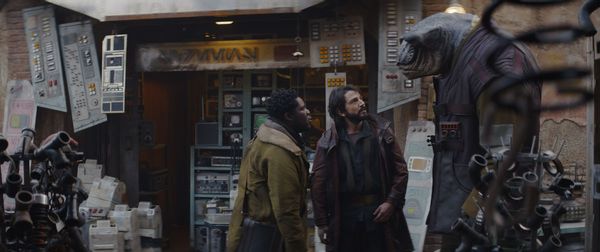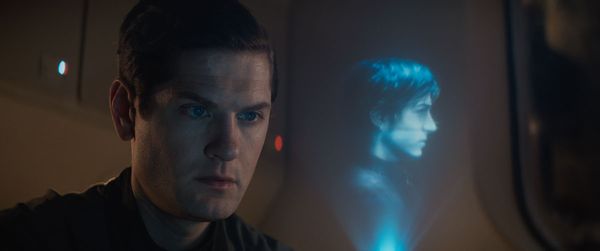
Cassian Andor's introduction to the world came a month after America elected Donald Trump, when "Rogue One: A Star Wars Story," hit theaters. Back then, the horror of that historic turn was still raw, and most people refused to name the obvious reason Trump won, which was bigotry and white grievance. Most, but not all.
"Rogue One" co-writer Chris Weitz unleashed a barrage of anti-Trump tweets, including one he was made to delete: "Please note that the Empire is a white supremacist (human) organization." Then-Disney CEO Bob Iger downplayed the connection Weitz tacitly made between "Rogue One" and anti-MAGA sentiment.
"Frankly, this is a film that the world should enjoy," he told The Hollywood Reporter, insisting that a movie about a ragged, multicultural band of anonymous freedom fighters sacrificing themselves to bring down Imperial fascism was not "in any way, a political film. There are no political statements in it, at all."
Six years later, Disney+'s "Andor," the backstory of Diego Luna's rebel spy, requires no such prevarication. Set five years before the events of "A New Hope," "Andor" rewinds to the time before there was a Rebel Alliance, and Cassian Andor is simply a thief trying to stay off the Empire's radar. Cassian's friends on the industrial planet Fennix, such as they are, tolerate him more than they like him. He doesn't mean them any harm, though it's obvious that he tests their patience.

Cassian Andor's origin story as a mercenary, operative and killer is not especially unique. Film and television are full of self-serving criminals transformed into self-sacrificing heroes by circumstance. Should aspects of his journey seem familiar, that could be because Gilroy wrote the screenplay for the Jason Bourne trilogy.
Initially, "Andor" is presented as a character study. It doesn't take long for it to set up an examination of how capitalism supports oppressive systems, making life difficult for anyone trying to eke out a living independent of those structures.
That's what "Star Wars" has always been about — if you look beyond the florid speeches about searching one's feelings. Of course, the Skywalker Saga never called attention to that part, preferring to mesmerize children and the young at heart with philosophical musings about not giving into hate and lifting boulders with focused thought.
Cassian and his compatriots . . . don't have the time or luxury to contemplate the Force and its mysteries.
Cassian and his compatriots on Ferrix, which could be any working-class community left to pick the bones left behind by a greedy conglomerate, don't have the time or luxury to contemplate the Force and its mysteries.
In a similar vein, flashbacks to Cassian's childhood reveal him to be a victim of environmental exploitation. The Force didn't protect Cassian's home planet of Kenari from being mined to the brink of extinction when he was a boy (played by Antonio Viña) hiding in the forest with other children, including his sister. It didn't save him when Imperials showed up to bury the mining disaster that had turned the place into poison. Other people did that. "Andor" is a show the world should enjoy, to use Iger's words, mainly because series creator Tony Gilroy uses the title character to depict how a world degraded by malevolence can be saved by people who find common cause in fighting it.
Gilroy writes Cassian as a man who understands what it means to live in a constant state of anxiety and navigate political uncertainty, a feeling to which plenty of us can relate. His arc is one of the ways "Rogue One" establishes that behind all the noble speeches about freedom made by senators and royals in war rooms on secret bases are everyday people pressed to make the sacrifices deemed necessary for the good fight to be possible. Sometimes, that means committing unthinkable acts.
In "Rogue One," his introduction comes by way of a sequence that closes with him murdering an ally. This doesn't valorize Cassian; on the contrary, right after he pulls the trigger, his expression goes blank. For a moment, he looks horrified with himself. Then he presses onward with cold purpose.

But the true eye-opener is what happens next. The dead men's boss urges his subordinate, Deputy Inspector Syril Karn (Kyle Soller), to cover up the murders. His reason is simple: They weren't especially well-liked, and since few will miss them, turning their deaths into a murder investigation isn't worth risking being hassled by the Empire.
As cheap as their unknown perp's life may be, the lives of two employees breaking rules and causing trouble are even cheaper. At least Karn's boss can place a monetary value on them; in the end, the company is better off without them. Workers are expendable.
Careers are made by stepping on the necks of the unworthy, which is why Karn sees finding his colleagues' murderer as the key to rising through the corporate ranks. His zealotry isn't motivated by a need to do the right thing – he wants to succeed, and therefore rise. Thus, he redirects Pre-Mor Authority resources to hunting Cassian, recruiting a sergeant eager to put his restless unit's militarized training into practice by cracking a few bystanders' skulls to get the job done. Their non-sanctioned field mission crumbles into an explosive example of overuse of police force resulting in an unarmed civilian's death.
Gilroy and the show writers are not particularly oblique in making these parallels between the strife fracturing these places in that galaxy long ago and far away. But their resemblance to the existential and moral crisis our democracy faces in 2022 only makes "Andor" more relevant than nearly every other title in the "Star Wars" TV series stable except, perhaps, for "The Mandalorian."
"Andor," like "Rogue One" before it, assures the viewer that there are no magical paths to overcoming evil.
Neither Din Djarin's journey nor Cassian's are rooted in the Force or ominous mumbo-jumbo about the Dark Side, though "The Mandalorian" is obligated to remind us of the Jedi's presence because of Baby Yoda's central role in the show, which nobody minds.
Meanwhile "Andor," like "Rogue One" before it, assures the viewer that there are no magical paths to overcoming evil. Only effort, sweat and a willingness to take incredible risks for the sake of either holding the line or gaining inches of ground can get it done. If a broad audience gets behind Cassian Andor, that's because he's the man this nascent rebellion needs. But he's also the type of figure we now realize any of us could become.
The first three episodes of "Andor" are now streaming on Disney +. New episodes stream on Wednesdays.







